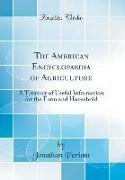- Start
- The American Encyclopaedia of Agriculture
The American Encyclopaedia of Agriculture
Angebote / Angebote:
Excerpt from The American Encyclopaedia of Agriculture: A Treasury of Useful Information for the Farm and HouseholdFoul with weeds as to require a fallow, but not what is too often understood by that term in this country. In England, when a farmer was com pelled to fallow a field, he let the weeds grow into blossom and then turned them down, in America, a fallow meant a field where the pro duce is a crop of weeds running to seed. Instead of a cr0p of grain. Again, the art of breeding the best animals and the best vegetables, by a judicious selection of individuals to propagate from. These improvements, with others too numerous to be here specified, have rendered the agriculture of the early part of the century very different from that of the middle ages when it had sunk far below the degree of perfection which it had reached among the Romans. In relation to the difficulties experienced in advanc ing agricultural art in the United States, it is well known that the earliest settlers found the country a wilderness, with many varieties of climate and soil, of which they were entirely ignorant, and to which the knowledge they had obtained in the mother country did not apply. Thus, they had to contend with the innumerable obstacles, such as the wilderness of nature, their ignorance of the climate, the hostility of the In dians, the depredations of wild beasts, the diffi culty and expense of procuring seeds, farming implements and superior stock. These various difficulties are quite sufficient to explain the slow pro 'ess they made in the way of improve ment. Or many years agriculture was in an exceedingly backward and depressed condition. Stocks and tools were poor, and there were obstacles and prejudices against any innovations in the established routine of practice. This state of things continued for many years with very little change. Jared Eliot, a clergyman of Connecticut, one of the earliest agricultural writers of America, published the first of a series of valuable essays on Field Husbandry, in 1747, but with this and a few other exceptions, no real efforts were made to improve farming until after the revolution, when the more settled state of the country and the gradual increase of population, began to impress the intrinsic import ance of the subject upon the minds of a few enlightened men. They sought by associated effort to awaken an interest in the subject, and spread abroad valuable information. The South Carolina Agricultural Society was established in 1784, and still exists, and the Philadelphia Society for the Improvement of Agriculture, established in the same year, and a similar association in New York in 1791, incorporated in 1798, and the Massachusetts Society for the Promotion of Agriculture, established in 1792, were active in their field of labor, and all accomplished import ant results. The correspondence at this period between Sir John Sinclair and Washington, shows how anxious was the father of his country to promote the highest interests of the people by the improvement of agriculture. But all the efforts of the learned, and all the investigations of the. Scientific, prove comparatively unavailing, unless the people themselves - the actual workers of the sell - are prepared to receive and profit by their teachings. Many years elapsed before the habit of reading became sufficiently common among the masses of the actual tillers of the soil. To justify an expectation that any profit would arise from the annual publication of the transactions of the several societies. Tire.About the PublisherForgotten Books publishes hundreds of thousands of rare and classic books. Find more at www.forgottenbooks.com
Folgt in ca. 10 Arbeitstagen
